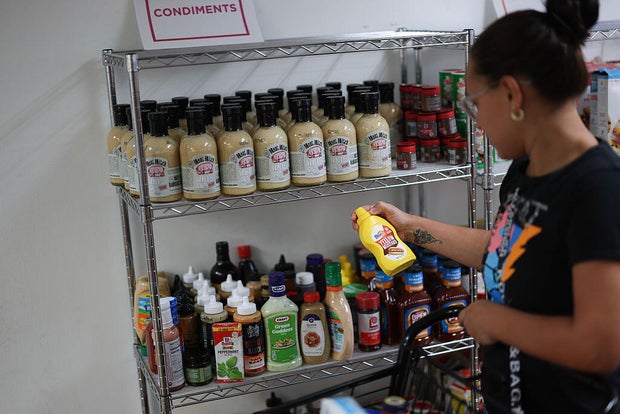Washington — A coalition of officials from half of the states and the District of Columbia sued the Trump administration on Tuesday over the suspension of food stamp benefits amid the ongoing government shutdown, as millions of Americans brace for a disruption in federal food aid in the coming days.
The states, which include California, New York and Pennsylvania, are asking a federal judge in Massachusetts to order the Department of Agriculture to provide benefits through the Supplemental Nutrition Assistance Program for November, including by tapping into a contingency fund to ensure the assistance continues to flow to more than 25 million people living within their borders.
They argue that the administration’s decision to cut off food stamp payments, which are provided to roughly 42 million people nationwide, is unlawful and threatens to deprive millions of Americans of essential food benefits that help protect against food insecurity and hunger.
“Shutting off SNAP benefits will cause deterioration of public health and well-being,” state officials wrote in their lawsuit. “Ultimately, the States will bear costs associated with many of these harms. The loss of SNAP benefits leads to food insecurity, hunger, and malnutrition, which are associated with numerous negative health outcomes in children, such as poor concentration, decreased cognitive function, fatigue, depression, and behavioral problems.”
Joe Raedle / Getty Images
The states involved in the suit are Arizona, California, Colorado, Connecticut, Delaware, Hawaii, Illinois, Kansas, Kentucky, Maine, Maryland, Massachusetts, Michigan, Minnesota, Nevada, New Jersey, New Mexico, New York, North Carolina, Oregon, Pennsylvania,?Rhode Island, Vermont, Washington and Wisconsin.
As the government shutdown continues to drag on, the Trump administration announced last week that federal food aid would not go out on Nov. 1 after the Department of Agriculture declined to tap into roughly $5 billion in contingency funds to keep benefits through the food stamp program flowing.
The agency blamed Democrats for failing to back a House-passed stopgap bill to fund the government, writing on its website that “the well has run dry.”
“We are approaching an inflection point for Senate Democrats,” the notice from the Agriculture Department reads.
The agency’s plan for a lapse in funding, issued Sept. 30, said that multi-year contingency funds could be used for state administrative expenses to ensure states could continue SNAP operations during a shutdown and were also available “to fund participant benefits in the event” of a funding lapse.
But a memo from the USDA issued last week said “contingency funds are not legally available to cover regular benefits” and are instead meant for things like assisting people in disaster areas. The document cited Hurricane Melissa, which made landfall Tuesday in Jamaica as one of the strongest Atlantic storms ever recorded.
Still, state officials argued in their lawsuit that the USDA’s claim that the contingency funds can’t be used to fund food benefits during a lapse in federal funding violates the text of congressional appropriations law and is a “dramatic change” in its own policy.
They noted that during the last shutdown, USDA said in guidance in January 2019 that said that “limited funding is available from the contingency that can be used to provide benefits for February.”
“Millions of Americans are about to go hungry because the federal government has chosen to withhold food assistance it is legally obligated to provide,” New York Attorney General Letitia James said in a statement. “SNAP is one of our nation’s most effective tools to fight hunger, and the USDA has the money to keep it running. There is no excuse for this administration to abandon families who rely on SNAP, or food stamps, as a lifeline. The federal government must do its job to protect families.”
The Trump administration has attempted to ramp up the pressure on Democrats to reopen the government, announcing cancellations of federal funding for programs in blue states and issuing layoff-notices to thousands of federal workers.
The ongoing shutdown, which is in its 28th day, is now the second-longest on record.
Ahead of the approaching halt to food stamp payments, some states have said they will work to keep the assistance going to beneficiaries. Roughly 1 in 8 Americans receive food stamps, and recipients receive, on average, a payment of $187 on prepaid cards that can be used to buy groceries.
The impending lapse in food stamps has raised concerns among Republicans and Democrats. GOP Sen. Josh Hawley of Missouri introduced legislation last week that aims to ensure continued funding for the food assistance program during the shutdown. The plan has garnered support from 10 other Republican senators and Democratic Sen. Peter Welch of Vermont.
Democrats have separately urged Agriculture Secretary Brooke Rollins to use the agency’s reserve funds to help cover food stamp benefits next month, though she has declined to do so.



